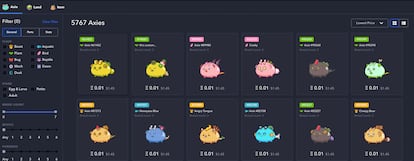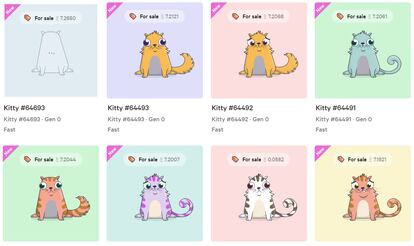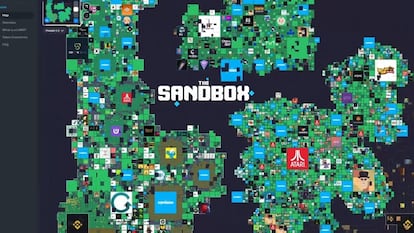When playing video games becomes a full-time job
The digital economy has created a new market that can turn a love of online gaming into a profitable occupation through titles such as Axie Infinity and The Sandbox

The coronavirus pandemic has led to the transformation of many sectors and video games is one of them. For some players, spending a few hours playing for fun is a thing of the past. Some people may think the rise of e-sports has already changed the face of gaming from a pastime to a career, but what has been happening over the past few months goes even further. Games such as Axie Infinity, CrytpoKitiies and The Sandbox have created a new digital market that has transformed entertainment into cash. And not because they sell millions of copies, but because blockchain has allowed cryptocurrencies to become the focal point of these games, known as crypto games.
Axie Infinity, the main driver of this revolution, is the easiest example to understand how this new economic activity works. It is similar to Pokémon, with players collecting, training, feeding, buying and trading “axies,” which are loosely inspired by the axolotl. The idea of the game is to obtain these characters with small love potions, which are used to feed them. Via blockchain technology, these potions have been turned into a cryptocurrency known as Smooth Love Potion (SLP), which can be used to trade on the digital market. The best players can earn up to 1,500 SLP (around $470, €400) a day.
But this explanation is incomplete without mentioning NFTs (non-fungible tokens), which have already revolutionized the world of art and collectors. The first-ever tweet recently sold for $2.5 million (€2.13 million) and practically anything collectable can be obtained with NFT, which makes perfect sense if the project to create metaverses becomes reality. A metaverse is a universe built in cyberspace that can be accessed via virtual reality and in which, in an ideal world, people can travel through different shared experiences with millions of other users.

In Axie Infinity, these digital characters can be bought and sold because they are converted into NFTs. They carry a unique value in ether (ETH), the second most-used cryptocurrency after bitcoin. As well as the axis themselves, players can trade them in-game items such as flowers, homes and barrels.
Jordi Armbruster, executive director of EthicHub, says that this has completely disrupted the digital economy. In a few months, Axie Infinity has generated over $2 billion (€1.7 million) in transactions. “In the gaming world, previously you paid to gain access. Now, in the blockchain era, that logic has shifted. You share the value created. You generate a token and you share it with the entire community, in this case, other players.” In order to get started on Axie Infinity, new players need at least three axies, which can be bought or rented. Although the price changes constantly, the initial investment costs around $350 (€300).
The advantage cryptocurrency holds is the ease with which new assets can be invented. This is the case with Axie Infinity Shards, an Ethereum-based cryptocurrency. Users have voting rights in the governance of the title, which in turn allows them to obtain a share of the community treasury. “They have even taken the digital gold represented in the game and turned it into real gold. They have transformed a digital activity, typical of a metaverse, into an activity with tangible value in the physical world,” says Álex Preukschat, a representative of the Blockchain Iberoamérica and Blockchain España alliance. This is precisely one of the characteristics of these virtual universes: the creation of a digital economy.

Keeping economies afloat
Axie Infinity, which was created by Vietnamese studio Sky Mavis, currently has around 350,000 daily players, based mostly in the Unites States, Venezuela and the Philippines. In the latter, the crypto gaming boom has been such that it has helped to keep part of the national economy afloat after the crisis caused by the coronavirus pandemic. “By doing very little, you can earn around €500 [$560],” says Floren Molina, a cyber defense manager at the consultancy firm Accenture. “That amount is what players generate on average, and is a decent wage in the Philippines. Many people have found jobs like this in a metaverse. And many more will. Cryptocurrency wallets, with the help of bitcoin, are already commonplace.”
If we look at the most profitable transactions, a player sold a mystic axie called Angel at the end of last year for 300 ETH – around $117,000 (€99,700). CryptoKitiies, a very similar game to Axie Infinity but with cats instead of axolotl-like creatures, generates transactions in that region. One, called Dragon, was sold for 600 ETH, nearly $165,000 (€140,600). “In the blockchain era, the network effect can be tokenized. Facebook does so with likes, for example. The network effect carries huge value in these games, where any interaction, data or movement between users generates more and more value with NFTs,” Armbruster explains.
It is difficult to dispel doubts as to whether these metaverses created by video games are surrounded by excessive speculation. Crypto games are very fashionable now, but the digital economy burns through different periods at breakneck speed. A majority of experts concur that they are here to stay. There will be adjustments, and ups and downs, until stability is achieved. As Sergio Gallastegui, executive director of CodeContract, notes, the comparative security of these digital assets works in their favor. Through blockchain technology they are unique and impossible to replicate. “An economy has been created that is regulated and controlled by blockchain. You can review everything that has happened with these assets, which cannot be duplicated. And as they are unique, their value skyrockets,” Gallastegui explains.

Another advantage is the decentralization of power. As has happened with bitcoin, there are no large corporations or central authorities to impose rules. Gamers and developers can meet, share advice and earn money together through one-on-one transactions. This is the case with The Sandbox, which is similar to the hugely popular Minecraft, where players build things and trade them in the form of NFTs. The most common one in The Sandbox is plots of land on which to build within the game. Last February, for example, these virtual plots were sold for a combined value in excess of $2 million (€1.7 million).
Such is the novelty and noise these game-based metaverses are making that Spain, according to many experts, has a golden opportunity to become a global reference point in the industry. Spanish developers Satoshis Games and Triple 0 Games, the latter of which recently raised €200,000 (€176,000) in funding for its new game Battle Derby, are at the forefront of the development of crypto games, although they have yet to achieve financial success on the scale of Sky Mavis. Other similar titles that are becoming more and more popular are in a similar position: Alien Worlds, Plant vs Undead and Night Life. “Decentralized finances use money. The cryptocurrencies create this money. NFTs have allowed assets to become tokenized. And these games are going to revolutionize everything: they are going to generate a lot of money now that we have established the use of blockchain,” Armbruster sums up.
English version by Rob Train.
Tu suscripción se está usando en otro dispositivo
¿Quieres añadir otro usuario a tu suscripción?
Si continúas leyendo en este dispositivo, no se podrá leer en el otro.
FlechaTu suscripción se está usando en otro dispositivo y solo puedes acceder a EL PAÍS desde un dispositivo a la vez.
Si quieres compartir tu cuenta, cambia tu suscripción a la modalidad Premium, así podrás añadir otro usuario. Cada uno accederá con su propia cuenta de email, lo que os permitirá personalizar vuestra experiencia en EL PAÍS.
¿Tienes una suscripción de empresa? Accede aquí para contratar más cuentas.
En el caso de no saber quién está usando tu cuenta, te recomendamos cambiar tu contraseña aquí.
Si decides continuar compartiendo tu cuenta, este mensaje se mostrará en tu dispositivo y en el de la otra persona que está usando tu cuenta de forma indefinida, afectando a tu experiencia de lectura. Puedes consultar aquí los términos y condiciones de la suscripción digital.








































